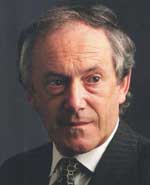SPEAKER'S PROFILES
Peter Atkins
 Peter Atkins began his academic life as an undergraduate at the University of Leicester, and remained there for his PhD. He then went to UCLA as a Harkness Fellow and returned to Oxford in 1965, as professor of chemistry and Fellow of Lincoln College. His research was in the application of quantum mechanics to chemical problems, but with time he drifted into writing books, which now number over 60. The best known of these is Physical Chemistry, now in its eighth edition. His other textbooks include Inorganic Chemistry, Molecular Quantum Mechanics, and various flavours of General Chemistry. He also writes books on science for the general public, including The Periodic Kingdom, Galileo’s Finger, Creation Revisited, and (most recently) Four Laws that Drive the Universe.
Peter Atkins began his academic life as an undergraduate at the University of Leicester, and remained there for his PhD. He then went to UCLA as a Harkness Fellow and returned to Oxford in 1965, as professor of chemistry and Fellow of Lincoln College. His research was in the application of quantum mechanics to chemical problems, but with time he drifted into writing books, which now number over 60. The best known of these is Physical Chemistry, now in its eighth edition. His other textbooks include Inorganic Chemistry, Molecular Quantum Mechanics, and various flavours of General Chemistry. He also writes books on science for the general public, including The Periodic Kingdom, Galileo’s Finger, Creation Revisited, and (most recently) Four Laws that Drive the Universe.
In his spare time Professor Atkins is deeply involved in a variety of international activities, including (until 2006) chairing the Committee on Chemistry Education of the International Union of Pure and Applied Chemistry which has the task of improving chemical education worldwide, especially in developing countries, and encouraging and coordinating international efforts towards the public appreciation of chemistry. He is a member of the organizing committee of a series of conferences on chemistry for the Middle East. He has been a member of the Council of the Royal Society of Chemistry; he has also been a member of the council of the Royal Institution. He has a strong interest in eliminating irrational and superstitious attitudes to life, and is a prominent proponent of atheism and a secular society.
Professor Atkins has honorary degrees from the universities of Utrecht and Leicester and is an honorary professor of Mendeleyev University, Moscow. He is a foreign member of the Academia della Scienza of Bologna, received the Meldola Medal of the Royal Society of Chemistry and their Nyholm Lectureship; he is an honorary associate of the Rationalist Press Association. He retired from his Oxford position in 2007, but continues to write, travel, and lecture.







